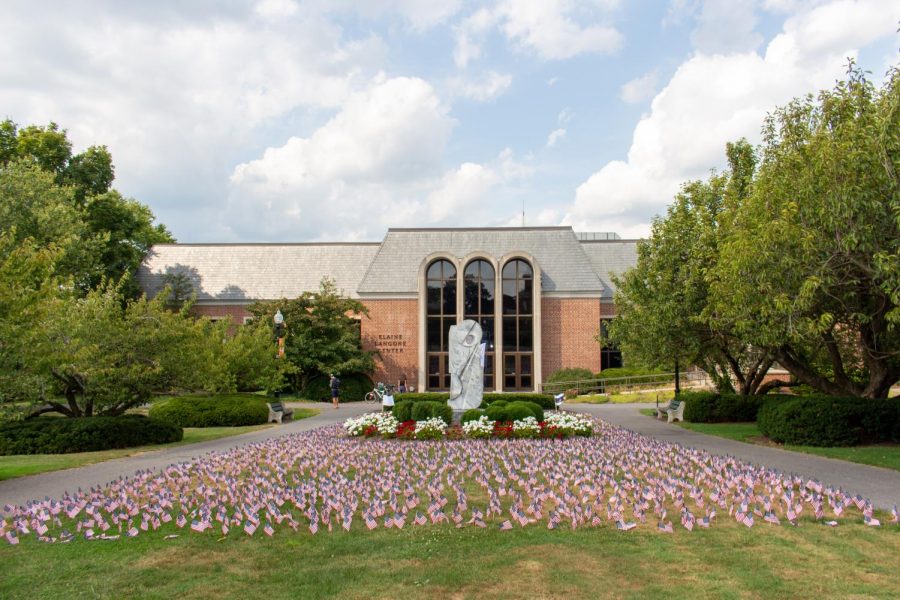Editorial: As a tragedy fades from vivid memory, how should the University remember 9/11?
September 12, 2019
Eighteen years ago this week, the Sept. 11, 2001 terror attacks took the lives of nearly 3000 people in New York City, Shanksville, Pa. and Washington, D.C. Keeping with the tradition of years past, Americans vowed once again to “never forget” the tragedies that occurred on that autumn morning. In Lower Manhattan, a light display of the World Trade Center’s twin towers joined the city’s skyline on the eve of the 18th anniversary of the attacks.
At the University, the Conservative Club and College Democrats joined together to place flags outside the Elaine Langone Center lawn as a memorial to those who perished. The campus community remembered the lives of University alumni Keith Coleman ’90, Brad Fetchet ’99, Mark McGinly ’97 and Bonnie Smithwick ’68, while others may have privately remembered those from their personal communities who died in the attacks. Countless individuals posted on social media images recalling the strength of first responders and the communities affected by the attacks.
For the most part, however, this Wednesday passed by as normal a day as any other at the University.
Perhaps it’s for the best that the fear and panic of this tragedy is not as fresh in our minds. Poignant moments for past generations, such as the bombing of Pearl Harbor or the assassination of President John F. Kennedy, were salient in the years that followed but have since been etched into history and receded from contemporary memory. Yet, as the demographics of the college-aged population shift, it should be as important as ever that both the University and the student body take more responsibility for remembering the attacks and honoring those who lost their lives. Members of the Class of 2020 – many of whom entered preschool in September of 2001 – are likely the last students remaining with some memory (whether vivid or faint) of the attacks. Some members of the Class of 2023 were not yet born when the tragedy occurred.
Two years ago, The Bucknellian used this space to ponder whether the memory of 9/11 was fading. Now, as the final wave of students who might hold memories of the attacks is set to graduate in the spring, it feels as if we have truly reached a crossroads for how we approach 9/11 remembrance.
While some classes on Wednesday did discuss the attacks and their historical significance, members of the editorial board felt that every class ought to at least acknowledge the importance of the day. If we really wish to “never forget,” the University should promote more discussion of 9/11 in classes. Even though this subject may not directly relate to each course offered at the University, it would seem contrary to the values of a liberal arts institution to not engage in some sort of dialogue about 9/11.
Likewise, it’s on our students to keep 9/11 in the conversation. The Bucknellian commends the Conservatives Club and College Democrats for co-sponsoring the placing of flags on the ELC lawn, and for continuing this annual tradition. Still, if a student failed to walk by this memorial, he or she would find no other acknowledgment of 9/11 on campus. The responsibility of remembrance should not fall solely on the shoulders of these two clubs, so it is the responsibility of other organizations as well as individual students to find more ways to keep alive the legacy of its victims.
We should be thankful that we now live in less fear of such attacks and have the privilege to treat Sept. 11 like any other day. But as discussions of 9/11 move closer to history and feel less tangible for some, we need a long-term plan for ensuring that future University students will not be so removed from the discussion of this tragedy and that they “never forget” the memory of those who died.






















